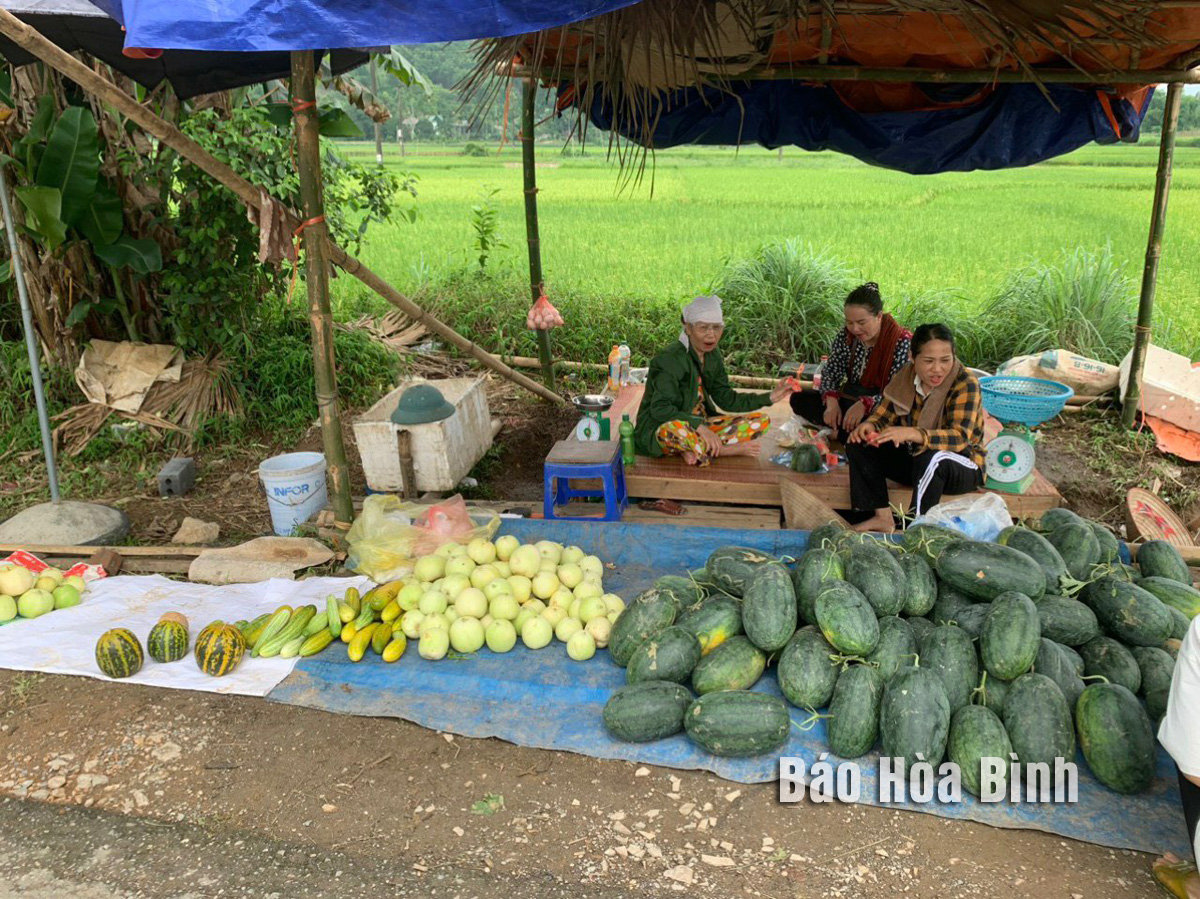
Currently, farmers in Kim Boi district are busy harvesting various types of melon, such as honeydew melon, cucumber, and watermelon. The cultivation of these plants has so far helped farmers maximise land use, enhance production value per unit area, and contribute to the restructuring of local crops.

Farmers from Sao Bay commune sell melons along a national
highway.
These days, local growers are working hard to reap the fruit
of their labour. In addition to wholesale, they sell melons at local markets
and roadside stalls. Favourable prices have been recorded, with watermelons
sold for 10,000-15,000 VND (0.4-0.6 USD) per kg, and cucumbers and honeydew
melons for 12,000-15,000 VND per kg.
According to the Kim Boi Department of Agriculture and Rural
Development, this spring crop saw over 52 hectares of watermelons, nearly 300
hectares of cucumbers, and over 52 hectares of honeydew melons planted. Their
plantations concentrate in the communes of Du Sang, Vinh Dong, Sao Bay, Nam
Thuong, and Kim Lap. Harvesting progress now varies from 50-80%, with the rate
for cucumbers topping, at over 80%.
In recent years, Vinh Dong commune has seen many households
opting to plant cucumber. Its cultivation is relatively simple and it can bring
about higher income than rice, with stable market demand. Bui Thi Anh, a
resident in Chieng hamlet in Vinh Dong, said: "This season, my family grew
over 1,000 square meters of cucumber As soon as we harvest, traders and locals
buy them immediately."
Deputy Director of the department Nguyen Thi Minh Anh noted
that these crops suit the local soil and climate, therefore, the district
encourages farmers to actively shift crop structure to maximise land use and
increase income. This year’s early hot weather has boosted melon consumption as
they are sought-after for summer cooling.
According to her, from the beginning of the season, the
district collaborated with specialists to train farmers in melon cultivation
and caring techniques toward the best yields and quality. However, due to the
lack of a product purchasing unit, melons are still retailed, resulting in
unstable prices. Moving forward, the district will encourage growers to
continue maintaining their growing areas and advise them to avoid overplanting
to prevent oversupply and subsequent price drops, thus negatively impacting
their livelihoods.
Since the beginning of this year, under the direction of the Department of Agriculture and Environment, the Sub-Department of Agricultural, Forestry, and Fishery Product Quality Management has strengthened the integration of the professional activities to promote and guide the organizations and individuals in the production and trading of agricultural, forestry, and fishery products to comply with the legal regulations regarding the use of chemicals, pesticides and veterinary medicines in crop cultivation, livestock farming and aquaculture. They also provide guidance to processing and manufacturing establishments on keeping the records to trace the product origins and using food additives from the approved list according to the regulations.
Hoa Binh province saw a significant rise in state budget revenue in the first two months of 2025, heard a meeting chaired by Vice Chairman of the provincial People’s Committee Quach Tat Liem.
Ha Thi Ha Chi, a 26-year-old graduate in law, has taken an unconventional path by returning to her hometown in Mai Chau district to establish the Tong Dau Cooperative, creating stable jobs for local women and bringing Thai ethnic brocade weaving to the global market.
As the Lunar New Year 2025 approached, pork prices surged, creating a profitable season for farmers in Tan Vinh commune, Luong Son district. Taking advantage of the rising demand, Can Minh Son, a farmer from Coi hamlet, sold over 30 pigs at 69,000 VND/kg, each weighing more than 100 kg. After deducting expenses, his family earned a profit of over 50 million VND.
alternate member of the Central Party Committee, Secretary of the Hoa Binh provincial Party Committee Nguyen Phi Long on March 5 had a working session with Yan Jiehe, Founder and Chairman of the China Pacific Construction Group, one of China's largest private corporations in the field of transport infrastructure. Deputy Secretary of the provincial Party Committee, Chairman of the provincial People's Committee Bui Duc Hinh and leaders of provincial departments and sectors also attended the working session.
The electronic printed circuit board (PCB) manufacturing and processing plant of Japan’s Meiko Group, located at Da River Left Bank Industrial Park in Hoa Binh city with a total investment of over 200 million USD, is expected to create thousands of jobs and make a significant contribution to the local budget.



